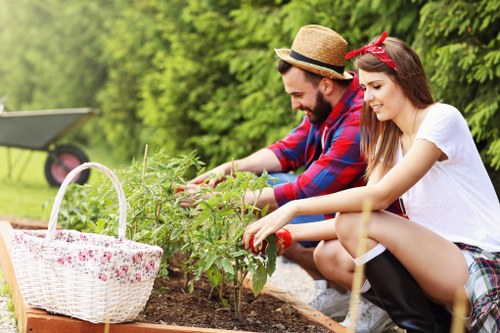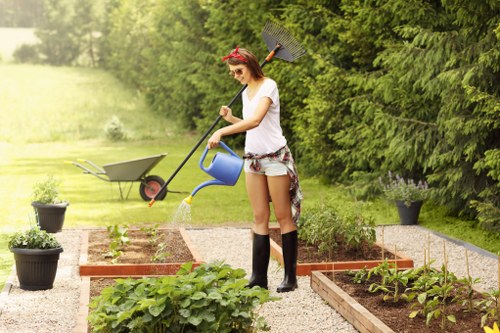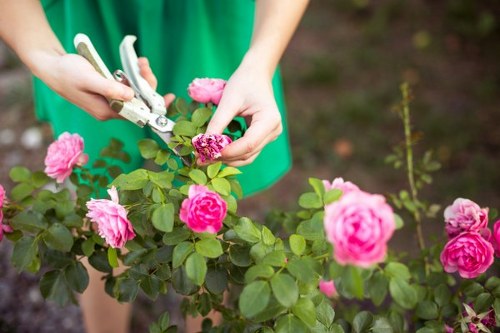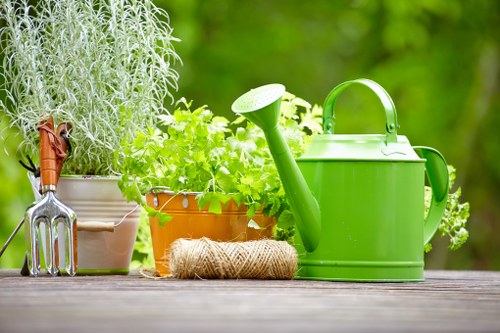Comprehensive Guide to Garden Maintenance in Bethnal Green

Introduction to Garden Maintenance in Bethnal Green
Maintaining a beautiful garden in Bethnal Green requires dedication, knowledge, and the right resources. Whether you're a seasoned gardener or a novice, understanding the unique aspects of garden care in this vibrant London neighborhood is essential for creating a thriving outdoor space.
Bethnal Green's urban environment presents both challenges and opportunities for garden enthusiasts. From limited space to diverse plant species, this area offers a dynamic setting for cultivating a lush and inviting garden.
In this guide, we will explore the best practices for garden maintenance in Bethnal Green, covering everything from soil preparation to seasonal care tips.

Understanding Bethnal Green's Climate and Soil
Climate Considerations
Bethnal Green experiences a temperate maritime climate, characterized by mild winters and warm summers. This climate is generally favorable for a wide range of plants, but it also means gardeners must be prepared for occasional frost and unexpected weather changes.
Understanding the local weather patterns is crucial for planning your garden maintenance schedule. For instance, knowing the average last frost date can help you time sowing seeds and planting tender plants appropriately.
Additionally, leveraging microclimates within your garden, such as sheltered areas or spots with more sunlight, can enhance plant growth and resilience.

Essential Garden Maintenance Practices
Soil Preparation
Healthy soil is the foundation of a thriving garden. In Bethnal Green, it's important to regularly test your soil's pH and nutrient levels to ensure optimal conditions for your plants.
Amending the soil with organic matter, such as compost or well-rotted manure, can improve soil structure, fertility, and drainage. This practice enhances the ability of plants to absorb nutrients and water effectively.
Mulching is another vital aspect of soil maintenance. Applying a layer of mulch helps retain moisture, suppress weeds, and regulate soil temperature, creating a stable environment for plant roots.
Tools and Equipment
Investing in quality gardening tools can make maintenance tasks easier and more efficient. Essential tools include:
- Hand trowel
- Pruning shears
- Watering can or hose
- Garden fork or spade
- Gloves
Regular Maintenance Schedule
Creating a maintenance schedule helps ensure that all aspects of your garden are attended to consistently. Key tasks to include are:
- Watering and irrigation management
- Weeding and pest control
- Pruning and trimming of plants
- Fertilizing and soil conditioning
- Seasonal planting and harvesting

Seasonal Garden Care in Bethnal Green
Spring Maintenance
Spring is a crucial time for garden maintenance, marking the start of the growing season. Begin by clearing away winter debris and preparing your beds for new growth.
Planting early spring flowers and vegetables can take advantage of the mild weather. Additionally, applying a balanced fertilizer replenishes nutrients depleted during the winter months.
Regular watering is essential as plants start to establish themselves. Ensure that newly planted areas receive adequate moisture to encourage healthy root development.
Summer Care Tips
During the summer, focus on maintaining consistent moisture levels to prevent plants from drying out. Employing drip irrigation or soaker hoses can help deliver water efficiently.
Pruning flowering plants promotes better air circulation and reduces the risk of diseases. Deadheading spent blooms encourages continuous flowering.
Keep an eye out for pests and take prompt action to manage infestations. Organic pest control methods are ideal for maintaining a healthy garden ecosystem.
Autumn Preparation
Autumn is the time to prepare your garden for the colder months. Remove spent plants and add compost to enrich the soil for the next planting season.
Planting hardy perennials and bulbs in autumn ensures they are well-established to bloom in the spring.
Protect sensitive plants by mulching and covering them to shield against frost and temperature fluctuations.

Choosing the Right Plants for Bethnal Green Gardens
Flowering Plants
Selecting the appropriate flowering plants can add color and vibrancy to your garden. Consider species that thrive in Bethnal Green's climate, such as:
- Roses
- Lavender
- Marigolds
- Hostas
- Lilacs
Vegetable Gardening
Growing your own vegetables is both rewarding and practical. Popular choices for urban gardens include:
- Tomatoes
- Salad greens
- Herbs like basil and parsley
- Root vegetables such as carrots and radishes
- Peppers
Shade and Sun Plants
Understanding the light exposure in different areas of your garden helps in selecting suitable plants. Areas with full sun are ideal for sun-loving plants, while shaded spots can accommodate plants that prefer lower light conditions.
Balancing sun and shade plants ensures a diverse and resilient garden ecosystem.
Native vs. Exotic Plants
Incorporating native plants supports local biodiversity and requires less maintenance. However, exotic plants can provide unique aesthetic appeal and variety.
Mixing both native and exotic species can create an aesthetically pleasing and sustainable garden environment.
Container Gardening
For those with limited space, container gardening offers a versatile solution. Utilize pots, hanging baskets, and vertical planters to maximize your garden's potential.
Ensure containers have proper drainage and use high-quality potting mix to support plant health.
Regularly rotate and care for container plants to prevent overcrowding and promote even growth.
Professional Garden Maintenance Services in Bethnal Green
While DIY garden maintenance is fulfilling, professional services can offer expertise and save you time. Local garden maintenance companies in Bethnal Green provide a range of services, including:
- Lawn care and turf management
- Tree and shrub pruning
- Plant health assessments
- Landscape design and implementation
- Seasonal clean-ups
Hiring professionals ensures that your garden receives the specialized care it needs to thrive throughout the year.
Moreover, expert gardeners can offer personalized advice tailored to your garden's specific conditions and your preferences.
Benefits of Hiring Local Experts
Local garden maintenance experts understand the unique climate and soil conditions of Bethnal Green. This knowledge allows them to make informed decisions that benefit your garden's health and appearance.
Additionally, supporting local businesses contributes to the community's economy and fosters relationships with knowledgeable professionals.
Cost Considerations
Investing in professional garden maintenance can be cost-effective in the long run. Proper care and maintenance prevent costly repairs and replacements caused by neglect or improper practices.
Obtain quotes from multiple providers to ensure competitive pricing and services that align with your budget.
Choosing the Right Service Provider
When selecting a garden maintenance service in Bethnal Green, consider the following factors:
- Experience and expertise
- Range of services offered
- Customer reviews and testimonials
- Pricing and contracts
- Availability and responsiveness
Choosing a reputable and reliable service provider ensures that your garden is well-cared for and maintained to the highest standards.
Scheduling Regular Visits
Establishing a regular maintenance schedule with your chosen service provider keeps your garden in optimal condition. Regular visits allow for timely interventions, such as pruning, fertilizing, and pest control.
Consistent maintenance also supports plant health and encourages continuous growth and beauty in your garden.
Eco-Friendly Garden Maintenance Practices
Sustainable Gardening Techniques
Embracing eco-friendly gardening practices contributes to a healthier environment and a more sustainable garden. Key techniques include:
- Composting organic waste
- Using natural fertilizers and pesticides
- Implementing water-saving irrigation systems
- Choosing native and drought-resistant plants
- Promoting biodiversity through plant variety
Water Conservation
Water conservation is crucial, especially during dry spells. Implementing rainwater harvesting systems and using drip irrigation can significantly reduce water usage.
Mulching also helps retain soil moisture, decreasing the need for frequent watering.
Organic Gardening
Opting for organic gardening methods minimizes the use of harmful chemicals, fostering a healthier garden ecosystem. Benefits include:
- Improved soil health
- Attraction of beneficial insects
- Reduced risk of plant diseases
- Enhanced flavor and quality of produce
Wildlife-Friendly Gardens
Creating habitats for local wildlife supports biodiversity and contributes to a balanced garden environment. Incorporate features such as birdhouses, insect hotels, and native plant species to attract beneficial creatures.
Encouraging pollinators like bees and butterflies enhances plant reproduction and overall garden vitality.
Reducing Waste in the Garden
Minimizing waste through recycling and repurposing materials supports sustainable garden practices. Consider the following strategies:
- Reusing old containers for planting
- Composting kitchen and garden scraps
- Repurposing fallen branches for garden structures
- Using biodegradable materials for mulching
By reducing waste, you contribute to environmental conservation and maintain a cleaner, more efficient garden space.
Energy-Efficient Gardening
Incorporate energy-efficient practices, such as using solar-powered garden lights and tools. These choices reduce your garden's carbon footprint and promote sustainability.
Additionally, selecting manual gardening tools over electric ones can further decrease energy consumption.
Eco-Friendly Pest Control
Integrated Pest Management (IPM) offers a balanced approach to controlling pests without relying heavily on chemicals. Methods include:
- Introducing natural predators
- Using physical barriers
- Employing organic pesticides when necessary
- Encouraging plant diversity to deter pests
Eco-friendly pest control protects beneficial insects and maintains a healthy garden ecosystem.
Enhancing Garden Aesthetics in Bethnal Green
Creating an aesthetically pleasing garden involves thoughtful planning and design. Consider the following elements to enhance your garden's beauty:
- Plant selection and arrangement
- Incorporation of hardscape features like pathways and seating areas
- Use of color, texture, and form for visual interest
- Lighting and decorative elements
- Seasonal plantings for year-round appeal
Landscape Design Principles
Applying fundamental landscape design principles ensures a harmonious and balanced garden. Key principles include:
- Symmetry and asymmetry
- Unity and variety
- Scale and proportion
- Focal points and framing
- Repetition and rhythm
Creating Focal Points
Focal points draw attention and add interest to your garden. Examples include:
- Feature trees or shrubs
- Water features like fountains or ponds
- Garden sculptures or art installations
- Vibrant flower beds
- Seating areas with distinctive design
Pathways and Walkways
Pathways guide visitors through the garden and connect different areas. Materials such as gravel, stone, or wood can complement your garden's style.
Incorporating curves and natural shapes into walkways enhances the garden's aesthetic and creates a more inviting atmosphere.
Outdoor Living Spaces
Designing outdoor living spaces, such as patios, pergolas, or gazebos, extends your garden's functionality. These areas provide spaces for relaxation, dining, and entertaining guests.
Furnishing these spaces with comfortable seating and decorative elements enhances their appeal and usability.
Planting Techniques for Visual Appeal
Strategic planting techniques can significantly impact your garden's visual appeal. Consider the following methods:
- Layering plants of varying heights for depth
- Using companion planting for added interest
- Incorporating foliage with different textures and colors
- Creating patterns and shapes with plant arrangements
- Seasonal rotations to maintain freshness
Color Coordination
Choosing a cohesive color palette enhances your garden's harmony. Complementary colors can create striking contrasts, while analogous colors provide a more subtle and unified look.
Consider the flowering seasons and plant bloom times to maintain color throughout the year.
Texture and Form
Incorporating plants with diverse textures and forms adds tactile and visual interest. Mix smooth-leaved plants with those that have rough or variegated foliage.
Varying plant shapes, from tall and slender to short and bushy, creates a dynamic and engaging garden landscape.
Seasonal Plantings
Planning for seasonal plantings ensures that your garden remains vibrant and attractive throughout the year. Incorporate spring bulbs, summer annuals, autumn perennials, and winter-friendly shrubs to maintain continuous interest.
Rotate plant species to keep the garden evolving and prevent stagnation.
Maintaining Garden Health and Longevity
Ensuring the long-term health and vitality of your garden involves proactive maintenance and care. Follow these guidelines to maintain a flourishing garden:
- Regular pruning to remove dead or diseased branches
- Timely watering based on plant needs and weather conditions
- Soil testing and amendment to support plant growth
- Integrated pest and disease management
- Seasonal clean-ups and preparation for changing weather
Pruning and Trimming
Pruning promotes healthy growth and maintains the desired shape and size of plants. Regular trimming prevents overcrowding and encourages better air circulation, reducing the risk of diseases.
Use sharp, clean tools to make precise cuts, and follow proper pruning techniques for each plant species.
Watering Strategies
Efficient watering practices are essential for plant health and water conservation. Water early in the morning to minimize evaporation and allow plants to absorb moisture throughout the day.
Adjust watering schedules based on seasonal changes and specific plant requirements to avoid over or under-watering.
Soil Health Management
Maintaining healthy soil supports robust plant growth and resilience. Regularly incorporate organic matter, such as compost, to enhance soil fertility and structure.
Avoid compacting the soil by reducing foot traffic and using raised beds or pathways to separate planting areas.
Integrated Pest Management
Implementing integrated pest management (IPM) techniques helps control pest populations without relying on harmful chemicals. Monitor plants regularly for signs of pests and take immediate action when necessary.
Encourage beneficial insects, such as ladybugs and predatory beetles, to naturally manage pest populations.
Fertilization and Nutrient Management
Providing plants with the necessary nutrients supports their growth and productivity. Use balanced fertilizers tailored to the specific needs of your plants.
Avoid over-fertilizing, which can lead to nutrient imbalances and environmental issues. Follow recommended application rates and schedules.
Mulching Benefits
Mulching offers multiple benefits, including moisture retention, weed suppression, and soil temperature regulation. Choose appropriate mulch materials, such as wood chips, straw, or compost, based on your garden's needs.
Apply mulch evenly around plants, keeping it a few inches away from stems and trunks to prevent rot and pest infestation.
Winterizing Your Garden
Preparing your garden for winter ensures that plants survive the colder months and are ready to thrive in the spring. Key winterizing steps include:
- Applying a thick layer of mulch to protect roots
- Covering sensitive plants with frost cloths
- Cleaning and storing garden tools
- Pruning deciduous plants to prevent damage
- Ensuring proper drainage to avoid waterlogging
Monitoring and Adjusting
Regularly monitor your garden's progress and make adjustments as needed. Stay informed about new gardening techniques and plant varieties that can enhance your garden's health and beauty.
Adapt to changes in weather patterns and garden conditions by being proactive and flexible in your maintenance approach.
Conclusion
Effective garden maintenance in Bethnal Green involves understanding the local climate, selecting suitable plants, and implementing consistent care practices. By following the guidelines outlined in this guide, you can create and maintain a beautiful, healthy, and sustainable garden that enhances your living space and contributes to the community's green landscape.
Whether you choose to manage your garden independently or enlist the help of professional services, dedication and knowledge are key to achieving a flourishing garden in Bethnal Green.
Start your garden maintenance journey today and enjoy the numerous benefits of a well-kept garden.
Contact us today to learn more about our garden maintenance services in Bethnal Green and transform your outdoor space into a lush oasis.